- Home
- David Lubar
Invasion of the Road Weenies Page 2
Invasion of the Road Weenies Read online
Page 2
Until now.
They walked toward the center of the cemetery, the spot they’d agreed upon for their midnight adventure. Jacob was the next to turn and run. “I can’t,” he said when they were halfway there. “Sorry.”
“Looks like it’s just you and me,” Lance said.
“Yeah.” Eric squeezed out that single word, not trusting his voice to speak a full sentence without trembling. Not much farther, he told himself. It wasn’t that far to midnight, and it wasn’t that far to the center of the cemetery.
Lance stopped walking. “You hear that?”
“No.” Eric looked around. “What?”
“I heard something. Footsteps.”
“Cut it out.” Eric listened to the dead silence around him.
“Man, don’t you hear it?” Lance asked.
Eric shook his head.
“Forget this,” Lance said. He spun away from Eric and sprinted back toward the gate.
Eric knew he was free to follow his friends. Just being the last to leave—that was a victory. But he was so close. He checked his watch. Only five more minutes.
He continued walking toward the center of the cemetery, his breath growing shallow, his ears straining for any hint of the sounds that had spooked Lance. He heard nothing. Any other place on Earth, the peacefulness would have been pleasant. Here, the silence was a reminder of what lay beneath the ground.
Eric reached the center of the cemetery, then checked his watch. Three minutes. He knew he could make it.
Just this once, he told himself. All he had to do was stay in place and fight the terror for a little while, and he’d be able to do anything—face any fear at all. He looked at the rows of headstones, wondering where Hunter was buried.
“People don’t understand.”
The voice from behind cut into his thoughts like a hatchet. Eric spun and shouted in surprise.
“Hey, relax,” the man said.
“You scared me,” Eric said. “I didn’t hear you walk up.” He was surprised a guy that big could move so quietly.
The man laughed and scraped a foot against the ground. “I’m not a ghost,” he said. He slapped his chest. “See, real and solid.”
“Yeah.” Eric waited for his nerves to stop buzzing.
The man put a hand on Eric’s shoulder. “People don’t understand,” he said. “There’s nothing scary here. The dead won’t hurt you.”
“Guess not,” Eric said. He wanted to pull away.
“No,” the man said, “the dead don’t hurt anyone. And they keep their secrets.”
Eric tried to step back. The fingers tightened on his shoulder.
“It’s the living,” the man said. “The people who haunt the places where nobody goes. That’s who you have to watch out for. It’s the people in the alleys, the people in the cemetery at night, the people who hope to catch you alone.”
“What?” Eric pulled harder against the man’s grip, trying to get free without turning his attempt into a struggle. He didn’t understand what this man was talking about. But deep inside, he was afraid he knew exactly what the man meant.
The bell in the town clock began to strike the hour.
The man laughed. He reached toward Eric with his other hand. “Let me go!” Eric shouted. He twisted his body, breaking loose. The instant he slipped from the man’s grasp, Eric rushed blindly away.
The man swore and chased after him. Eric could hear the footsteps close behind him. He knew that any second he’d be tackled or grabbed and swept off his feet. Then he’d be found dead like Hunter Reynolds, and the adults would talk about it in whispers.
Eric shouted again, but the bell drowned out his voice. He ran across a stretch of manicured lawn, dodging left and right between headstones, knowing his feet were landing on graves, knowing he stepped on the dead as he raced for his own life.
“Run, boy, run,” the man behind him yelled. “Makes it more fun.”
The sound of the bell wrapped around Eric like deep water. He gasped, trying to find more speed. As the twelfth peal rode on a wave through the air, Eric heard a scream—short, cut off, a howl of frustration and surprise—followed by another sound that he’d never forget—the wet thud of a thick fruit smashed against a sidewalk.
Eric dared a glance over his shoulder.
He stopped in his tracks. In this field of death, the living man who’d pursued him had—suddenly and undeniably—joined the dead. Trembling, Eric crept back even as his mind screamed for him to keep running.
The man had tripped and fallen, hitting his head on a gravestone. Eric didn’t want to look, but he had to. Death was still and quiet and final. The man’s legs rested above a grave. The earth was undisturbed except for a spot next to the man’s right foot. Here the earth was pushed up, the grass torn, as if a hand had risen to clutch at the passing ankle.
Eric knelt and gently touched the stone. “Thanks,” he whispered. He didn’t need to read the inscription. He knew who was buried there. “Thanks, Hunter. Sorry I didn’t come before.”
There was no answer. He expected none. Eric stood and walked slowly toward the cemetery gate. He had no urge to rush. He had no fear. He knew the dead would never hurt him.
COPIES
I hate getting dragged to Dad’s office for Take Our Kids to Work Day. It’s so boring, I want to scream. But at least I had company this year. My little brother was finally old enough to get dragged along with me.
“You kids are in for a real treat,” Dad said when we pulled into the parking lot. “We’ve upgraded our mail room. And we got a new shredder for the office. Bet you can’t wait to see that baby in action, right?”
“Right, Dad,” I said, grabbing Nicky by the collar so he wouldn’t wander into the path of any of the dozens of cars zipping through the parking lot.
Dad continued listing the wonders that lay ahead of us. “And here’s the best part. We just put in two new copiers. Real high-speed top-of-the-line machines. The best money can buy.”
Shoot. When he said that, I realized I’d forgotten to bring something to copy. It’s fun to run off a couple hundred cartoons and pass them out at school. But I didn’t have anything with me.
Wait. That wasn’t true. I had something way goofier than a cartoon. I had Nicky. The moment we got to Dad’s office, I asked if I could check out the copy room.
“Sure,” Dad said. “You know the way. Just don’t fool around too much. The company has a policy against personal copies.”
“You can trust me,” I said. “Come on, Nicky, I’ll show you Dad’s awesome new copiers.” I grinned at the thought of how personal a copy could be.
I led Nicky down the hall to the copy room. We were in luck. The place was all ours. “Here,” I said, pulling a chair over to one of the copiers. “Get up.”
Nicky climbed onto the chair. I lifted the lid of the copier. “Put your face down here,” I said. “But close your eyes. It can get real bright.”
As always, Nicky did what I told him. I tried to set the machine for ten copies, but my finger slipped. The display showed one thousand. Hey, why not, I thought, deciding to leave the number the way it was.
“Here goes.” I hit the COPY button.
Man, that sucker was fast. After a couple of seconds, copies started flying out like bullets from a machine gun. They looked real cool. Nicky had his face scrunched up, but you could tell it was him.
I glanced at the second copier and got another idea. I almost didn’t do it, but I couldn’t resist. Hey—what’s the harm? I slipped down my pants and sat on the machine. I’d heard about kids doing this, but I’d never tried it. I reached over and hit the buttons. Might as well make a thousand copies of my butt to go along with the thousand of Nicky’s face.
My machine was even faster. Before I knew it, I’d run off the whole batch. I hopped down and walked back over to Nicky.
“Hey, these aren’t that good.” I grabbed a copy as it shot out of the machine. The image was kind of faded. I thumbed through t
he stack. Maybe the machine was running out of supplies. Each copy that came out was a bit more faded.
“Can I get up now?” Nicky asked as the machine hummed to a stop. His voice sounded really muffled.
“Sure. Yeah. It’s done.”
Nicky stood up.
For a moment, I just stared. Then I blinked.
That was more than Nicky could do. His lips and eyelids were gone. Almost everything was gone. Most of his face had been copied away. Two small holes were all that was left of his nose. A pair of eyes stared out at me from a face like an egg.
Oh man, Dad was going to kick my butt.
My butt!
I raced over to the other machine and grabbed the last copy that came out. Nothing. Just a smooth, round hunk of flesh.
When my hand stopped shaking, I reached down the back of my pants. Smoothness. No crack. Nothing.
Nicky made some kind of noise in his throat, but I couldn’t understand him. Without a mouth, he couldn’t talk very clearly.
It was about then that I realized something awful. Truly awful. It was bad enough that Nicky couldn’t talk. But I had to go to the bathroom. And without a butt, I couldn’t do that, either.
SHAPING THE FOG
There was always fog. The world was never clear. Ken couldn’t imagine what it would be like to see into the distance—to gaze far away without the ground and rocks and trees growing fainter and fuzzier and whiter as they blended into the blank sea that formed the edge of the visible world. But there wasn’t always good fog.
Today, it looked like good fog.
“Can we?” Serra asked, sneaking up to the window next to Ken.
“I think so,” Ken said. He slid aside the screen and touched the air. He frowned for a moment as he rubbed the fog between his fingers, testing the feel. Then he smiled and nodded to Serra.
“Yay!” Serra shouted, leaping into the air.
“Quiet,” Ken said. “You’ll wake the old man.”
“I’ll go get Rowen,” she whispered.
“Okay. But be quiet.” Ken watched Serra tiptoe down the hall.
“Sshhhhh,” Ken warned again as Serra herded Rowen along the hallway.
“Good fog?” Rowen asked.
Ken nodded then opened the door slowly, trying to ease it past the spots where the hinges creaked. He followed the others out to the porch. “Not too far,” Ken said as they crept down the two steps to the moist ground.
He cupped the fog in his hands and pressed his fingers together. The soft dampness grew firm and warm in his grip. He released the ball and watched as it drifted toward the earth. This was good fog. Ken stooped and placed his hand beneath the piece of fog. He raised it up, stroking it gently, pressing and pushing, pinching, forming until it became a small bird.
“Serra. Catch!” Ken released the bird with a gentle push. It glided from his hand, leaving small wisps of fog behind as it slipped through the material of its creation.
Serra giggled and grabbed the bird. She turned it around and sent it floating back. Ken caught the bird and raised it for a closer look. It had already lost most of its shape. “They never last,” he said.
“The old man can make them last,” Rowen said, looking up from the large ball he had formed.
“Yeah. It takes practice. Skill, too,” Ken said. He reached into the fog again and began to gather another piece.
This time, he made a bat. Serra shrieked as it fluttered toward her, slashing her hands with enough force to turn the creature once more into formless mist.
“Sshhhhh!” Ken said.
“Sorry. You know that scares me.” Serra went back to her own sculpting.
Ken stroked the fog and wondered what to make next. He glanced toward Rowen. When he saw what was forming, his heart froze.
“Rowen! No! Never!” Ken rushed forward, waving his hands to create a breeze and puffing hard.
“You ruined it,” Rowen said as the fog in front of him dissolved into drifting tendrils.
Ken stood panting, trying to catch his breath. He shook his head. “Don’t ever do that again.”
“I wanted someone like me,” Rowen said. “You and Serra, you’re too big. I wanted someone small.”
“If he’d seen . . .” Ken said. “He’s told us a thousand times. Never like us. Never make our own form.”
“They do not last.” The voice, soft and sad, drifted from the porch. “Or if they last, they do not obey,” the old man said, walking stiffly down the steps.
Ken tried to explain. “He didn’t mean to. He didn’t know. He’s young. It won’t happen again.”
“No,” the old man said. “It won’t.” He took a deep breath and gently puffed the air toward Rowen. The boy swirled back into the fog from which he’d been formed. Another breath, and Serra was gone. He took a third breath and faced Ken.
Ken felt himself fading. As his awareness bled into the waiting mist, he saw the old man reach out and gently scoop a handful of fog.
WILLARD’S OPPOSITIONAL NOTEBOOK
On the very day that Willard decided to organize his life, he found a small notebook at a neighborhood garage sale. Perfect, Willard thought as he picked up the spiral-bound memo pad. “How much?” he asked the woman who stood in the driveway next to a pile of musty clothes, rusty tools, and dusty romance novels.
“Quarter,” she said.
Willard knew people expected customers to bargain at a garage sale, so he said, “I’ll give you a dime.”
“Sold,” the woman said.
“Okay,” Willard said when he got home. “Now I can list everything I want to do.” He grabbed a pen from the kitchen counter and wrote the first three things that came to mind: clean my room, finish my book report, watch Cartoon Cavalcade at six tonight.
“Whatcha got?” his sister Tammy asked as Willard was closing the notebook.
“Nothing,” Willard said.
“Can I see?”
“Nope.” He put the notebook in his pocket and started up to his room.
Before he got halfway up the stairs, the phone rang. It was his friend Preston. “I got my new video game,” Preston said. “Want to come check it out?”
“Sure.” Willard rushed over.
He stayed at Preston’s until dinnertime.
It wasn’t until the next morning that Willard realized he hadn’t done anything on his list. He ripped out the page and threw it away. Then he tried again.
“What are you writing?” Tammy asked as Willard made a note to put air in his bicycle tires.
“None of your business,” Willard said.
“Can I write something?” she asked.
Willard glared at his sister. “You don’t know how to write.”
“I can write my name,” Tammy told him. “I’ll show you.”
“Leave me alone.” Willard went outside to get away from his sister.
The next day, when Willard got on his bike and saw how squishy the tires were, he realized he’d forgotten about the air.
After several weeks of similar experiences, it began to dawn on Willard that anything he wrote failed to happen. From there, Willard made a small leap to a great idea. His hand trembled as he wrote the note to himself. Fail my math test.
Willard scored a B on the test, without even trying.
During the next month, Willard got great grades and wonderful gifts. The school bully left town. The movie theater let him in for free. He went to a ton of birthday parties. In every way possible, life was fabulous.
But paper was running out.
Willard held the notebook in his hands and thought about what he should write on the final page. He didn’t want to waste it.
Then he got the best idea of all. He wrote one word. Three small letters. Die. That was all.
This time, Willard wasn’t going to rip the page out. He planned to leave it bound forever between the covers. But he needed to put it somewhere safe. Somewhere it would never be disturbed. Willard left the notebook on his bed and went out the front do
or to check. Great—they were pouring concrete for the foundation of a new house down the block.
Willard searched in the basement until he found a small metal box. Then he went to his room. “Hey, what are you doing?” he asked Tammy, who was standing by Willard’s bedroom door.
“Nothing,” she said. She giggled and ran down the hall.
Willard hurried into his room and shoved the notebook in the box before his nosey sister could come back to snoop, then wrapped tape around it. That evening, right after the workers left, Willard snuck over to the site and pushed the box beneath the concrete.
Forever. Willard felt great. He went home and celebrated by making himself a hot fudge sundae. It didn’t spoil his appetite.
For the next month, Willard felt absolutely wonderful. The secret was so fabulous, he almost spilled it to his friends. But he wanted to keep it to himself for a while.
As great as he felt, he also felt hungry. Willard gained twelve pounds that month. Can’t hurt me, he told himself. I’m never going to die.
The next month, Willard gained eighteen pounds. As he stood looking at himself in a mirror in his room, Willard realized he had to watch what he ate. But at the moment he thought about it, another thought struck him—a thought that made him race down the hall to Tammy’s room.
“You wrote in it, didn’t you?” he asked.
Tammy shook her head.
“Tell the truth, Tammy. This is no joke. I know what you wrote,” Willard said, feeling the warm sweat of fear flowing down his forehead and the back of his neck.
“Just one letter,” she said. “That’s all. I wanted to show you I could write my name. I started to. But then I heard you coming and got scared you’d yell at me.”
In his mind, Willard saw the page from the notebook. With die, followed by the start of Tammy’s name. Just one letter. Enough to turn die into diet.
Willard wanted to scream at his sister, but that could wait. At the moment, he had an irresistible urge. There was a huge hunk of chocolate cake in the fridge, and it was calling to him.
A TINY LITTLE PIECE
Julie couldn’t wait to get to the museum. All week, she’d been looking forward to the trip. The museum had a special new exhibit—an actual mummy. It was part of an amazing discovery that had been made last year in Egypt. Julie had heard all about it on the news, and later she’d watched a special on one of the science channels. Archaeologists had uncovered an enormous tomb containing two thousand mummies, all perfectly preserved. The mummies had been sent to exhibitions throughout the world. And Julie was going to get to see one today—right in Grandville at the Junior Museum.

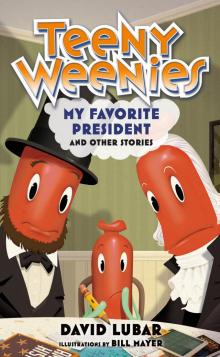 Teeny Weenies: My Favorite President
Teeny Weenies: My Favorite President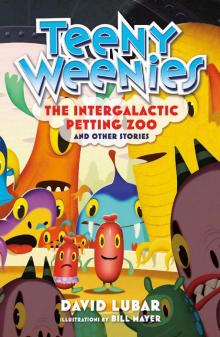 Teeny Weenies: The Intergalactic Petting Zoo
Teeny Weenies: The Intergalactic Petting Zoo Teeny Weenies: The Eighth Octopus
Teeny Weenies: The Eighth Octopus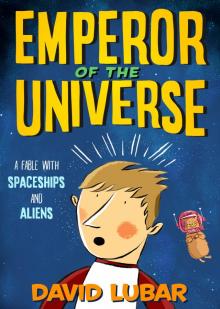 Emperor of the Universe
Emperor of the Universe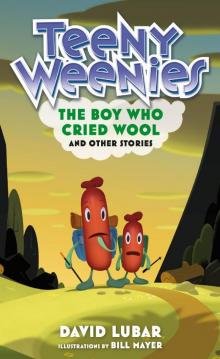 Teeny Weenies: The Boy Who Cried Wool
Teeny Weenies: The Boy Who Cried Wool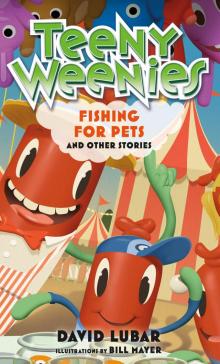 Teeny Weenies: Fishing for Pets
Teeny Weenies: Fishing for Pets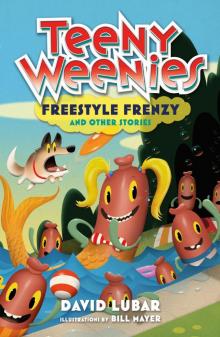 Teeny Weenies: Freestyle Frenzy
Teeny Weenies: Freestyle Frenzy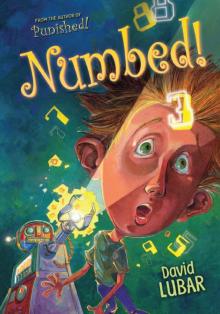 Numbed!
Numbed!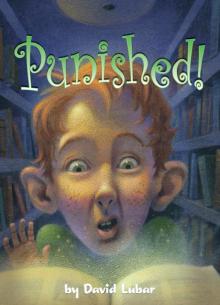 Punished!
Punished!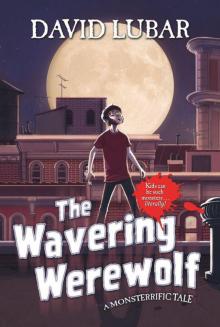 The Wavering Werewolf: A Monsterrific Tale (Monsterrific Tales)
The Wavering Werewolf: A Monsterrific Tale (Monsterrific Tales)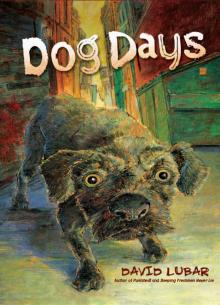 Dog Days
Dog Days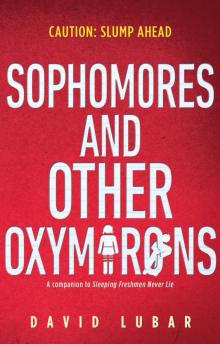 Sophomores and Other Oxymorons
Sophomores and Other Oxymorons The Psychozone
The Psychozone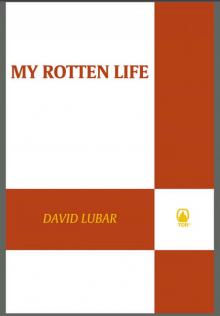 My Rotten Life
My Rotten Life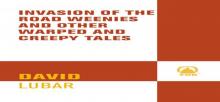 Invasion of the Road Weenies
Invasion of the Road Weenies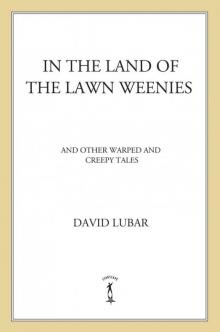 In the Land of the Lawn Weenies
In the Land of the Lawn Weenies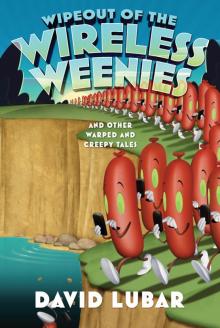 Wipeout of the Wireless Weenies
Wipeout of the Wireless Weenies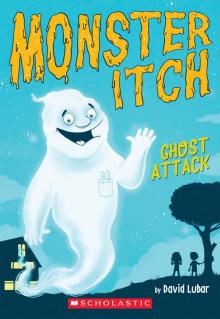 Ghost Attack
Ghost Attack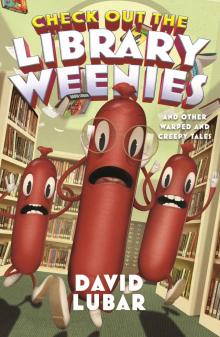 Check Out the Library Weenies
Check Out the Library Weenies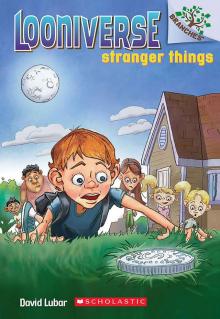 Looniverse #1: Stranger Things (A Branches Book)
Looniverse #1: Stranger Things (A Branches Book)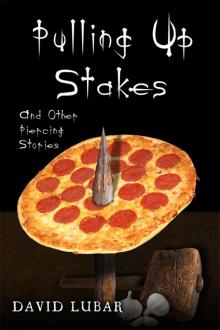 Pulling up Stakes and Other Piercing Stories
Pulling up Stakes and Other Piercing Stories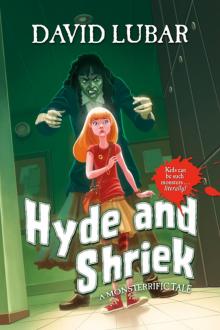 Hyde and Shriek
Hyde and Shriek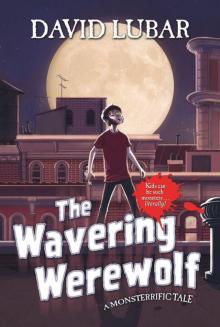 The Wavering Werewolf
The Wavering Werewolf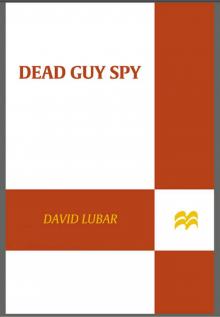 Dead Guy Spy
Dead Guy Spy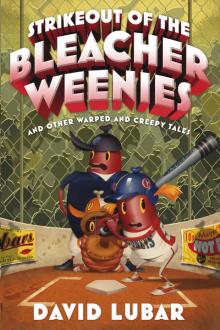 Strikeout of the Bleacher Weenies
Strikeout of the Bleacher Weenies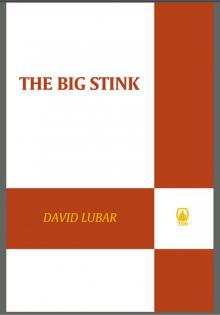 The Big Stink
The Big Stink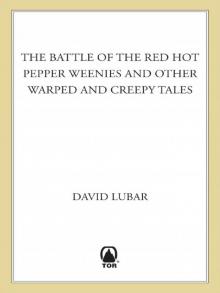 The Battle of the Red Hot Pepper Weenies
The Battle of the Red Hot Pepper Weenies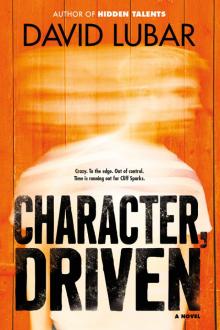 Character, Driven
Character, Driven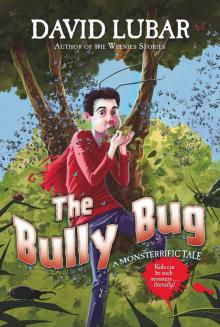 The Bully Bug
The Bully Bug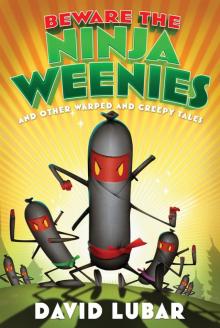 Beware the Ninja Weenies
Beware the Ninja Weenies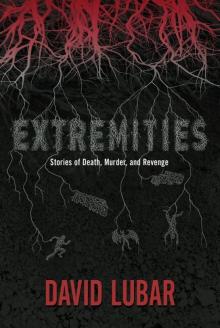 Extremities: Stories of Death, Murder, and Revenge
Extremities: Stories of Death, Murder, and Revenge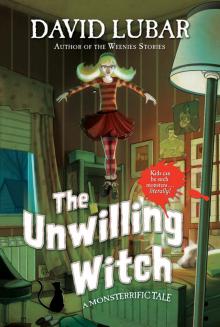 The Unwilling Witch
The Unwilling Witch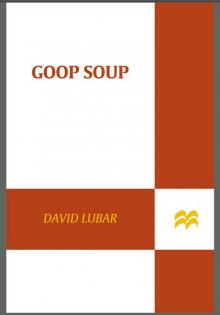 Goop Soup
Goop Soup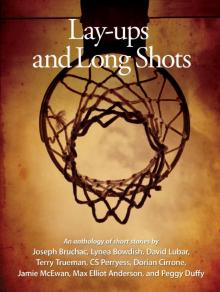 Lay-ups and Long Shots
Lay-ups and Long Shots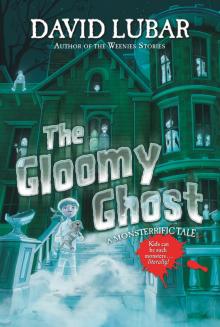 The Gloomy Ghost
The Gloomy Ghost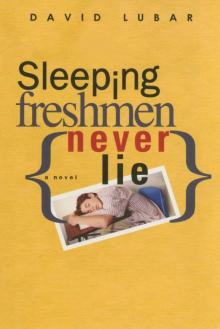 Sleeping Freshmen Never Lie
Sleeping Freshmen Never Lie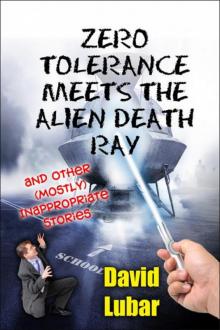 Zero Tolerance Meets the Alien Death Ray and Other (Mostly) Inappropriate Stories
Zero Tolerance Meets the Alien Death Ray and Other (Mostly) Inappropriate Stories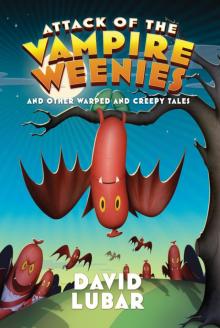 Attack of the Vampire Weenies
Attack of the Vampire Weenies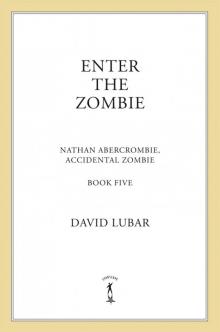 Enter the Zombie
Enter the Zombie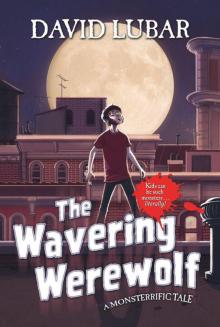 The Wavering Werewolf_A Monsterrific Tale
The Wavering Werewolf_A Monsterrific Tale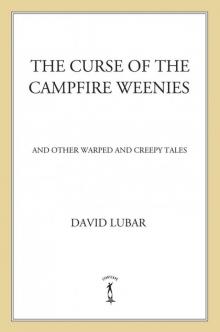 The Curse of the Campfire Weenies
The Curse of the Campfire Weenies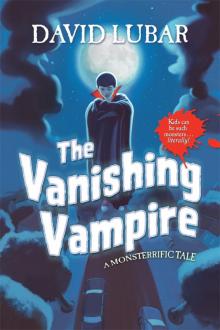 The Vanishing Vampire
The Vanishing Vampire